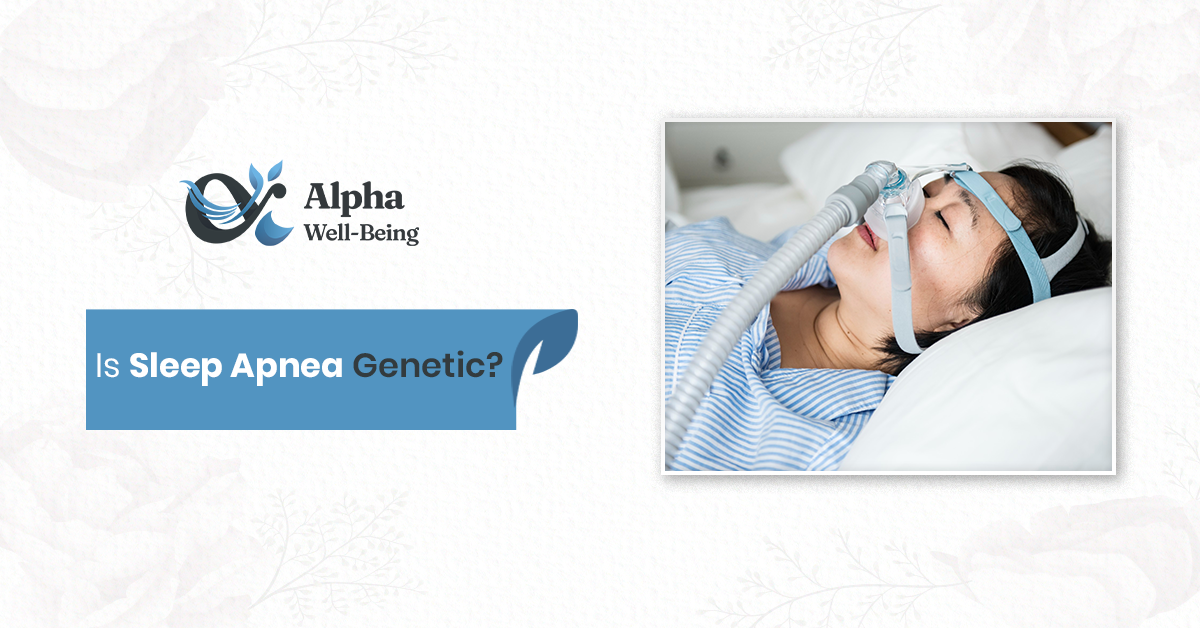So, can sleep apnea be inherited? While sleep apnea can have some genetic causes, it is not near as simple as inheriting your eye or hair characteristics.
Though, scientific studies suggest that 40% of people with obstructive sleep apnea (OSA) inherit it from their family. That seems to mean a lot.
However, other things, too, can influence your chance of getting this sleep disorder.
Think of it this way: the potential for sleep apnea may be in your genes, but how you live your life and your environment usually decide if it appears.
Is Sleep Apnea Genetic?
Yes, it can be.
Let’s get into what researchers have discovered about how sleep apnea runs in families:
- Family clustering – Studies show sleep apnea definitely runs in families. If your parent or sibling has it, your risk goes up. That’s worth paying attention to.
- Inherited physical traits – Many physical characteristics that add to sleep apnea can be passed down in your family:
- Face and skull shape
- Jaw structure and size
- Tendency toward a thicker neck
- Airway anatomy
- Tendency toward weight gain
- Genetic markers – Scientists have found specific genes that influence your sleep apnea risk, including ones that affect:
- How your breathing is controlled during sleep
- Where your body stores fat
- How your body handles inflammation
- Muscle control in your airway
Nevertheless, just having these genes doesn’t mean you will definitely experience sleep apnea. Genetics doesn’t define the course your life will take.
Is There a Gene for Sleep Apnea?
Further study is necessary at this point, but researchers have found evidence that connects OSA to several of these genes.
- ANGPT2 (Angiopoietin 2)
- TNF-α (Tumor Necrosis Factor-alpha) – specifically the −308G/A polymorphism
- LPAR1 (Lysophosphatidic Acid Receptor 1)
- GPR83 (G Protein-Coupled Receptor 83)
- ARRB1 (Beta-Arrestin 1)
- HIF-1α (Hypoxia-Inducible Factor 1-alpha)
- PTGER3 (Prostaglandin E Receptor 3)
These genes are involved in various biological processes, including:
- Inflammation
- Craniofacial development
- The regulation of breathing
While genes play a role in OSA, the condition is also affected by the environment.
Other Major Causes of Sleep Apnea
Let’s not rule out the other factors involved in sleep problems before you start blaming genetics for your sleep troubles.
- Weight – Having extra weight is one of the main reasons why sleep apnea occurs. Fat deposits around your upper airway can narrow the breathing passage while you sleep.
- Age – As we get older, our risk goes up. Those throat muscles that keep your airway open lose tone over time – just like other muscles in your body.
- Lifestyle choices – Smoking? Drinking alcohol before bed? Taking certain medications? All of these can relax those critical throat muscles, making them more likely to block your airway during sleep.
- Sleep position – Those who like to sleep on their back should focus on this information. When you are sleeping on your back, gravity moves your tongue and soft palate to the back of your throat.
What You Should Know
On a positive note, if sleep apnea is common in your family, you’re still able to get a good night’s sleep.
Unlike other genetic problems, there are several things you can do about sleep apnea.
Your narrow airway could have come from your dad and your body type from your mom, nonetheless, how you control these inherited traits is mostly in your hands.
These tips can help you either prevent or address your sleep apnea:
- Watching your weight and staying active
- Cutting back on alcohol, especially before bedtime
- Quitting smoking (for about a thousand reasons, but this is one more)
- Training yourself to sleep on your side
- Using a humidifier to keep airways moist
- Trying specialized sleep apnea pillows
Small changes can make a big difference in how well you sleep, even with a family history of sleep apnea.
When to Talk to A Doctor
Wondering if you should talk to someone about sleep apnea? Look for these signs:
- Loud snoring that can be heard from another room
- Episodes where you stop breathing during sleep (often noticed by a partner)
- Gasping or choking that wakes you up
- Feeling exhausted during the day, even after a full night’s sleep
- Morning headaches that just won’t quit
- Trouble focusing on tasks
- Feeling irritable or moody for no apparent reason
Don’t just assume that because your parent had sleep apnea, you should just live with it too.
Many people with genetic risk factors for sleep apnea live symptom-free with proper management.
The Outlook
While your DNA can influence sleep apnea, it is only one factor that plays a part. Understanding how your genes affect your health is more uplifting than concerning.
It gives you a chance to do the right things for your health, remain active and consult specialists when necessary.
The bottom line? Don’t lose sleep over your sleep apnea genes.
With awareness and the right approach, you can breathe easier at night, regardless of what your family tree suggests.
Get Sleep Apnea Solutions at Alpha Wellbeing Care
At Alpha Wellbeing Care, we get the connection between genetics, lifestyle, and sleep problems. Our sleep specialists create personalized plans that work with your situation.
Don’t let sleep apnea – genetic or not – steal another night of good sleep from you.
Schedule your sleep evaluation today.
Call us at (352) 593-3976 or visit our website to book your appointment.
FAQs
If my parent has sleep apnea, will I definitely get it too?
Simply having a family member with sleep apnea increases the chances of developing it, yet it doesn’t always happen. Your habits have a strong impact on your life.
Is it possible for children to develop sleep apnea after someone in the family had it? Sometimes, children can receive traits that raise their chances of sleep apnea such as certain facial features and body types.
Is it possible that sleep apnea can miss a generation?
It can appear to run in different families in various ways, affecting siblings differently.
Is there a genetic test for sleep apnea?
There is not a genetic test that can accurately predict sleep apnea.
To diagnose this disorder, doctors use the person’s symptoms, inspect their body and use sleep study devices.
Is there anything I can do to keep sleep apnea from running in my family?
Do what you have power over: watch your weight, exercise often, don’t have a drink at night, sleep sideways and schedule your doctor visits.



No comment